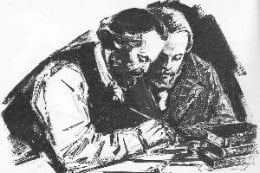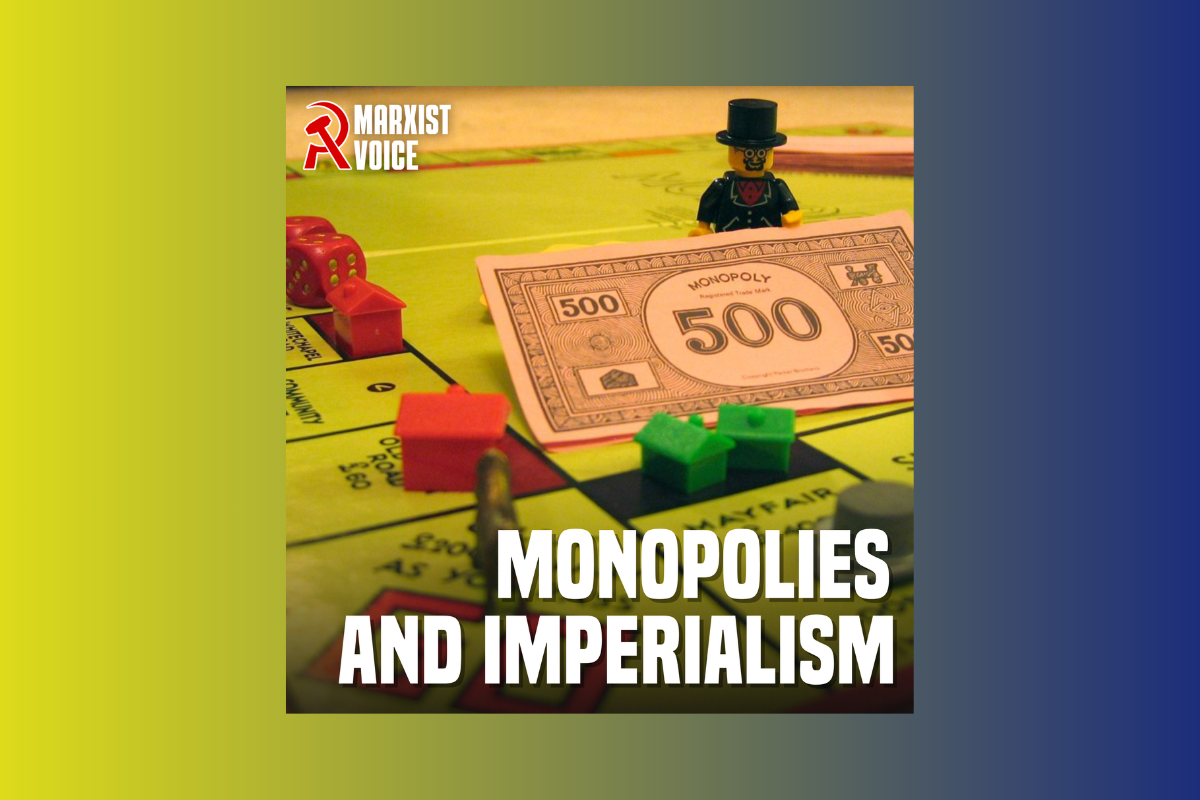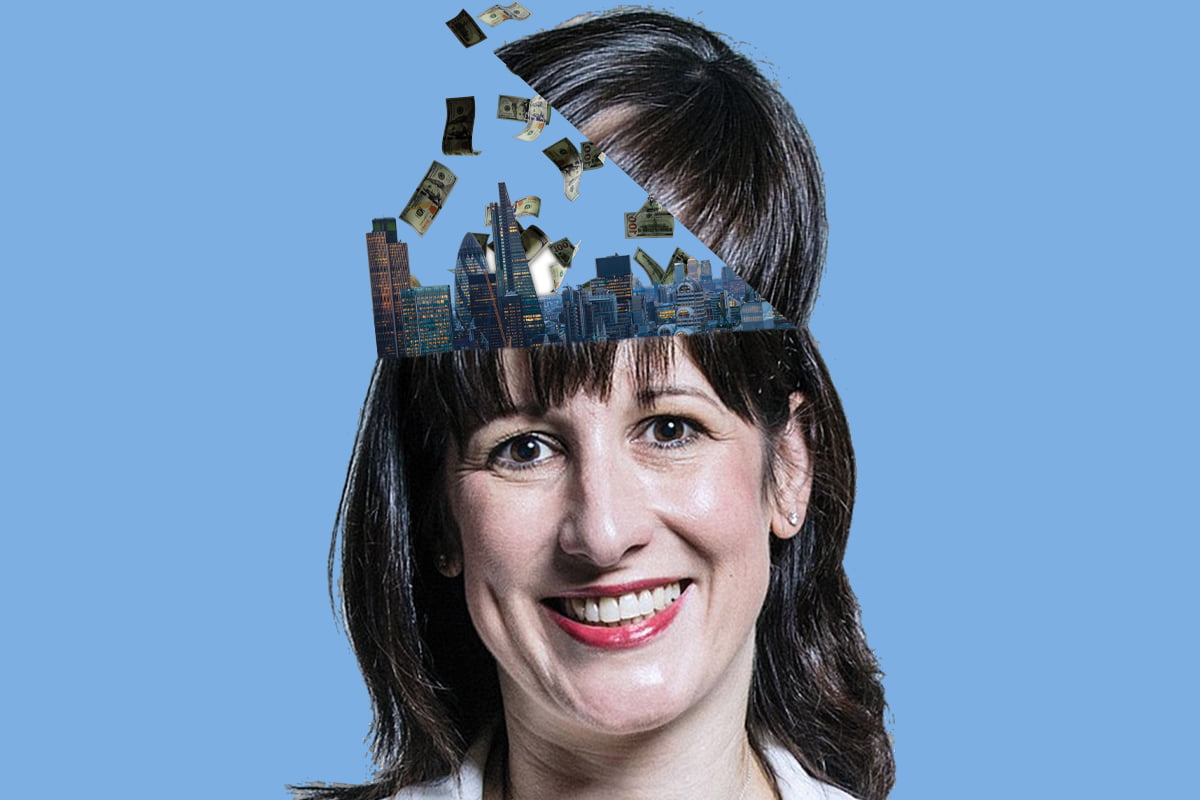We will deal with the tendency of the rate of profit to fall in a future article, but for now it is sufficient to observe that the views expressed in Anti-Dühring represent the standpoint of both Marx and Engels, which, despite all the efforts of the revisionists to misrepresent them, was identical.
We will deal with the tendency of the rate of profit to fall in a future article, but for now it is sufficient to observe that the views expressed in Anti-Dühring represent the standpoint of both Marx and Engels, which, despite all the efforts of the revisionists to misrepresent them, was identical. (Read part one)
Anti-Dühring
Let us see what Engels (and Marx) wrote in Anti-Dühring.
“We have seen that the ever increasing perfectibility of modern machinery is, by the anarchy of social production, turned into a compulsory law that forces the individual industrial capitalist always to improve his machinery, always to increase its productive force”, explains the author. “The bare possibility of extending the field of production is transformed for him into a similar compulsory law. The enormous expansive force of modern industry, compared with which that of gases is mere child’s play, appears to us now as a necessity for expansion, both qualitative and quantitative, that laughs at all resistance.” (14)
Having described the relentless growth of the productive forces under capitalism, driven by compulsory laws, the author then goes on to explain the fundamental contradiction that plagues the capitalist system: namely the continuous outpouring of commodities which eventually crash into the limits of the market.
“Such resistance is offered by consumption, by sales, by the markets for the products of modern industry”, explains Engels. “But the capacity for extension, extensive and intensive, of the markets is primarily governed by quite different laws that work much less energetically.”
Here Engels (and Marx) describes a gap opening up between production and consumption, which operate by different laws, some more vigorous than others. “The extension of the markets cannot keep pace with the extension of production. The collision becomes inevitable … Capitalist production has begotten another ‘vicious circle’,” explains Engels. (15) He makes the same point in the November 1886 Preface to Capital:?”While the productive power increases in a geometric, the extension of markets proceeds at best in an arithmetical ratio.”
So what is the character of crises under capitalism? Engels explains, “the character of these crises is so clearly marked that Fourier hit [the nail on the head] when he described the first as crise plethorique, a crisis of super-abundance.” (16) In other words, they were crises of overproduction.
This simply repeats what Marx had explained elsewhere. For instance, in volume one of Capital: “The enormous power, inherent in the factory system, of expanding by jumps, and the dependence of that system on the markets of the world, necessarily beget feverish production, followed by over-filling of the markets, whereupon contraction of the markets brings on crippling of production. The life of modern industry becomes a series of periods of moderate activity, prosperity, over-production, crisis and stagnation.” (17)
In explaining the Marxist theory of crisis, Engels demolishes Eugene Dühring’s attempt to explain crises by the “under-consumption of the masses.” Engels draws the clear distinction between “under-consumption” (which has always existed in class society, as a result of the poverty of the masses) and the phenomenon of overproduction, which is applicable to capitalism alone.
Use-values
Pre-capitalist societies were natural economies, mainly based on the production of use-values. The phenomenon of overproduction was unknown in these societies, which suffered from the opposite problem, namely the problem of under-consumption arising from the scarcity of use-values, as a result of the low level of the productive forces and the natural disasters (drought, plague, pestilence, etc.) as well as war, to which these societies were prone.
Overproduction, then, is peculiar to capitalism, and exists in no other society. It arises from the anarchic laws of the market economy and commodity production. Under capitalism, the productive forces have been revolutionized to such an extent that they could, if production was rationally planned and organized, completely satisfy the basic needs of society. They have completely outgrown the capitalist system and private ownership.
On the basis of a rational plan of production, the productivity of labour, and with it the living standards of the overwhelming majority, could be vastly increased in a relatively short space of time. The problem is that under capitalism production is not rationally planned, but geared to the maximization of profit and dominated by blind market forces. Here we are faced with the contradiction between social production and individual appropriation, where the capitalists appropriate the wealth produced by the social labour of the working class.
Overproduction arises under capitalism because the unlimited drive to expand production periodically comes into collision with the limited confines of the market economy. Plenty of people want and need things, but do not have the money to buy them. They lack “effective demand”, according to the bourgeois economists. This strange phenomenon of overproduction, where excess commodities, goods produced for sale, cannot be sold, arises ultimately from the fact that the working class cannot buy back the full value of what it produces. Profit is the unpaid labour of the working class. This state of affairs is irrational from any sane point of view, but arises out of the anarchy of the market economy and the class structure of capitalist society.
“Under-consumption” also exists under capitalism, as any working class person will testify. Surplus value cannot come from machines or buildings, which simply transfer their own value to the commodities. Only human labour is able to produce new value. The working class receives in wages less value than they produce. This unpaid labour is the source of surplus value, and is appropriated by the capitalist. The workers can never buy back what they produce as they only receive enough to maintain themselves and their families. As Marx explained, the problem is not to explain why there is crisis, but why, as a result, there is no permanent crisis under capitalism, starting from day one.
However, the capitalist system gets around this problem of insufficient “demand” with the division of the economy into two main sectors: department one, which produces consumer goods, and department two, which produces capital goods (means of production).
“One section of capitalists produce goods which are directly consumed by the workers”, explained Marx, “another section produce either goods which are only indirectly consumed by them, insofar, for example, as they are part of the capital required for the production of necessities, as raw materials, machinery, etc., or commodities which are not consumed by the workers at all, entering only into the revenue of the non-workers.” (18)
As long as the capitalist class, which appropriates the surplus value, takes the surplus and reinvests it in more new machinery, buildings and general infrastructure, the system can develop, but only at the cost of preparing the way for a new crisis of overproduction. In other words, the capitalist system creates its own market through the interaction between the two departments of production and temporarily overcomes this inherent contradiction. The only problem is that this increased capacity produces even more consumer goods, which eventually cannot be sold, and we have a new crisis. However, the slaughter of the values of capital arising from the slump, lays the basis for a new period of boom, but, in turn, reproduces the contradictions on a higher level. This takes the form under capitalism of a boom and slump cycle.
Unlimited expansion
The lack of purchasing power of the working class is therefore only one side of the equation. More significant is the capitalist’s continual drive for unlimited expansion by ploughing back the surplus extracted from the unpaid labour of the working class. This dialectical contradiction lies at the heart of the capitalist system. This uncontrolled drive to accumulate and produce will sooner or later hit the limits of consumption. Here we have a system of production for production’s sake, and accumulation for accumulation’s sake, as Marx explained. To sell this flood of commodities, the capitalist is forced to reduce his prices below the price of production, resulting in losses, falling profits, and likely bankruptcy. This drives out the weaker capitalists and prepares the ground for a new boom, based upon a higher rate of profit.
“[T]he under-consumption of the masses, the restriction of the consumption of the masses to what is necessary for their maintenance and reproduction, is not a new phenomenon,” explains Engels. “It has existed as long as there have been exploiting and exploited classes.” The crisis of overproduction is however a new phenomenon, which has arisen only under the capitalist mode of production. “Therefore, while under-consumption has been a constant feature for thousands of years”, continues Engels, it nevertheless “tells us just as little why crises exist today as why they did not exist before.”
He then goes on to explain the reason in the capitalist form of production, characterized by “the general shrinkage of markets which breaks out in crises as the result of a surplus of production [which] is a phenomenon only of the last fifty years.” (19)
The Marxist theory of crisis is based upon a dialectical contradiction: the unlimited drive to produce, which is unique to the capitalist mode of production, combined with the limited consumption of the masses arising from their social position. As a consequence, capitalism is like a man sawing away the branch on which he is sitting. It creates and destroys the market at the same time, by squeezing more and more surplus-value out of the working class, while attempting to hold down wages to the bare minimum. “The part falling to the share of the working class (reckoned per head)”, explains Engels, “either increases only slowly and inconsiderably or not at all, and under certain circumstances may even fall.” (20) This in turn becomes a barrier to the expansion of the market and therefore the realization of surplus value, as we are witnessing in this present period of prolonged austerity.
Push down wages
The capitalists as a whole naturally want to see an expanding market. Each individual capitalist would be delighted to see all competitors increase the wages of their workers to boost demand. Yet when it comes to their own workers, they are determined to keep down wages in order to reduce costs and increase profits. So the capitalists, driven by competition, all end up attempting to push down wages and therefore demand. “The product governs the producers”, explains Engels. (21) They are all caught up in this contradiction of capitalism.
In a kick against Dühring, Engels remarks: “It requires a strong dose of deep-rooted effrontery to explain the present complete stagnation in the yarn and cloth markets by the under-consumption of the English masses and not by the overproduction carried on by the English cotton mill owners”, states Engels. (22)
Such a view, it should be noted, has nothing in common with the positions of various schools of bourgeois economists known as “under-consumptionists”, most notably the Keynesians.
Marx himself had criticized the concept of “under-consumption” as the cause of crisis in volume two of Capital, written some ten years before Anti-Dühring. Consumption alone (or rather the lack of it) is not the fundamental cause, he explained. If this were the case, the problem could be solved by increasing the purchasing power of the masses. This is precisely the false argument of the Keynesians. Marx answers this as follows:
“It is a sheer tautology to say that crises are caused by the scarcity of effective consumption, or effective consumers. The capitalist system does not know [of] any other modes of consumption than effective ones. That commodities are unsaleable means only that no effective purchasers have been found for them, i.e., consumers (since commodities are bought in the final analysis for productive or individual consumption).”
He continues: “But if one were to attempt to give this tautology the semblance of a profounder justification by saying that the working class receives too small a portion of its own product and the evil would be remedied as soon as it receives a larger share of it and its wages increase in consequence, one could only remark that crises are always prepared by precisely a period in which wages rise generally and the working class actually gets a larger share of that part of the annual product which is intended for consumption. From the point of view of these advocates of sound and ‘simple’ (!) common sense, such a period should rather remove the crisis.” (23)
In other words, wages tend to rise at the peak of a boom, where labour tends to be in short supply, shortly before a slump in the economy. Therefore, lack of demand cannot be considered the real cause of the crisis of overproduction.
It is precisely the Keynesians who believe that crises are caused by a lack of “effective demand” (“under-consumption”) and that wages or state spending should be raised in order to fix the problem. Left reformists frequently put this Keynesian argument forward as a solution to the present crisis. While we are certainly in favour of increasing wages, the idea that this will solve the crisis of capitalism is completely wrong. In fact, increased wages will simply eat into profits and push the capitalists to cut back on investment and production, thereby cancelling out the effects of this measure. It is impossible to create demand from thin air. The laws of capitalism are determined by a system of commodity production, including labour power. To call for the state to “create” demand is also utopian. The attempt to use the printing press to “create” money, not backed by extra production, will only serve to fuel inflation and reduce workers’ income. The only other way for the state to increase spending is to take a further slice of the surplus value through taxation. Again, this will either mean cutting into profits, which will stop the capitalists investing, or taxing the working class, which will cut consumption, thereby reducing demand. It they borrow (deficit financing) they will have to pay it back with interest. At the end of the day, such solutions simply intensify the problems of capitalism, not solve them. It is a catch 22 situation.
“The whole mechanism of the capitalist mode of production breaks down under the pressure of the productive forces, its own creations,” states Engels. “It is no longer able to turn all this mass of means of production into capital. They lie fallow, and for that very reason the industrial reserve army must also lie fallow. Means of production, means of subsistence, available labourers, all the elements of production and of general wealth, are present in abundance. But ‘abundance becomes the source of distress and want’ (Fourier), because it is the very thing that prevents the transformation of the means of production and subsistence into capital.” (24)
Towards the end of his life, Engels once again returned to the fundamental contradictions of capitalism in his 1891 introduction to Marx’s Wage Labour and Capital. It could have been written to describe the situation in the world today. We therefore leave him the last word on the subject of crisis:
“this productivity of human labour which rises day by day to an extent previously unheard of, finally gives rise to a conflict in which the present-day capitalist economy must perish. On the one hand are immeasurable riches and a superfluity [super-abundance] of products which the purchasers cannot cope with; on the other hand, the great mass of society proletarianised, turned into wage-workers, and precisely for that reason made incapable of appropriating for themselves this superfluity [super-abundance] of products. The division of society into a small, excessively rich class and a large, propertyless class of wage-workers results in a society suffocating from its own superfluity [super-abundance], while the great majority of its members is scarcely, or even not at all, protected from extreme want. This state of affairs becomes daily more absurd and – more unnecessary. It must be abolished, it can be abolished.” (25)
[End]
Notes:
14 Engels, Anti-Dühring, p.326
15 Ibid, p.326, our emphasis
16 Ibid, pp.326-27
17 Marx, Capital, vol.1, pp.425-27, London
18 Marx, The Theories of Surplus Value, vol.3, p.41
19 Engels, Anti-Dühring, pp.340-4
20 Marx and Engels, Selected Works, vol.1, p.148
21 Engels, Anti-Dühring, p.322
22 Ibid, p.341
23 Marx, Capital, vol.2, pp.414-15
24 Engels, Anti-Dühring, p.335
25 Marx and Engels, Selected Works, vol.1, pp.148-9






